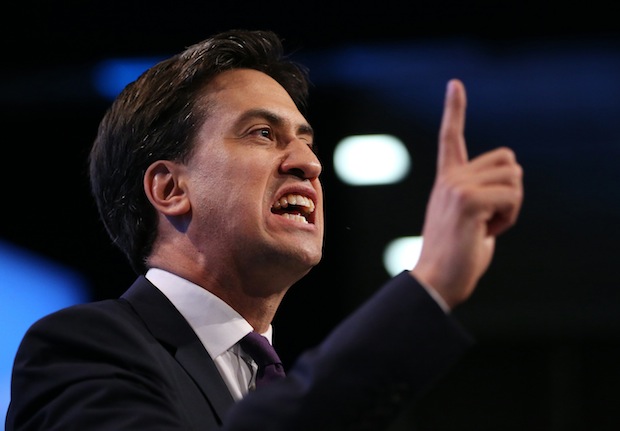For three years, though we’ve been told all about who Ed Miliband is, we’ve often wondered whether we’re getting his real thoughts when he speaks. The Labour leader has often given the impression that he doesn’t trust his instincts, that he thinks that he should be speaking from the centre ground rather than as ‘Red Ed’, and that his forays into tougher welfare and immigration policies are things he’d rather not do. But today the Labour leader decided to embrace what he truly believes in: big government. Big socialist government.
He announced price controls – ‘if we win the election in 2015 the next Labour government will freeze gas and electricity prices until the start of 2017’ – and a ‘use it or lose it’ planning policy that seems to include beefing up compulsory purchase orders.
This was Ed Miliband trusting his instincts, which is bold because they take him away from the centre ground that strategists are so fixated upon. But he tried to sell those instincts to voters as the ones they should trust too, above the polished delivery of David Cameron and Nick Clegg (although poor Clegg was never mentioned) who want to make the 2015 election a presidential one. His speech included a focus on the decency of Ed Miliband and of the Labour party, contrasted with a number of handy cock-ups by the Conservatives such as Lord Howell’s ‘desolate’ comments and the Home Office’s immigration vans. And then he drew personal contrasts between himself and David Cameron, saying:
‘If you want to know the difference between me and David Cameron, here’s an easy way to remember it: when it was Murdoch vs the McCanns, he took the side of Murdoch, when it was the doctors versus the tobacco lobby, he took the side of the tobacco lobby, when it was the millionaires wanting a tax cut versus the families hit by the bedroom tax – frankly, here’s an easy way to remember it; David Cameron was the Prime Minister who introduced the bedroom tax, I’ll be the Prime Minister who repeals the bedroom tax.
‘Here’s the thing about David Cameron: he may be strong at standing up to the weak, but he’s always weak when it comes to standing up to the strong. So let’s have that debate about leadership and character, and I relish that debate.’
In essence, that’s ‘bring it on: I’m nicer than you’.
Miliband’s constant refrain throughout the speech, said so many times that you couldn’t possibly miss it (a good thing when voters don’t have time to sift through speeches like this, if they’re listening at all). He said:
‘Six simple words that say Britain can do better than this. Britain can do better than this. We’re Britain, we’re better than this.
‘Are you satisfied with a country where people are working harder for longer for less, year after year after year. are you satisfied with a country divided, losing touch with the things we value the most. Are you satisfied with a country that shuts out the voices of millions of ordinary people and listens only to the powerful.
‘Are you satisfied with a country standing apart as two nations? Well, I’m not satisfied, we’re Britain, we’re better than this. And we have to rebuild anew. One Nation. An economy built on your success, a society based on your values, a politics that hears your voice, rich and poor alike accepting their responsibilities to each other – one nation, we’re going to make it happen and today I’m going to tell you how.’
No-one can accuse Ed Miliband of just complaining about the need for Britain to do better than this. His prescription to improve it is socialism, and he wants voters to trust him to give Britain that medicine to make it better.







Comments